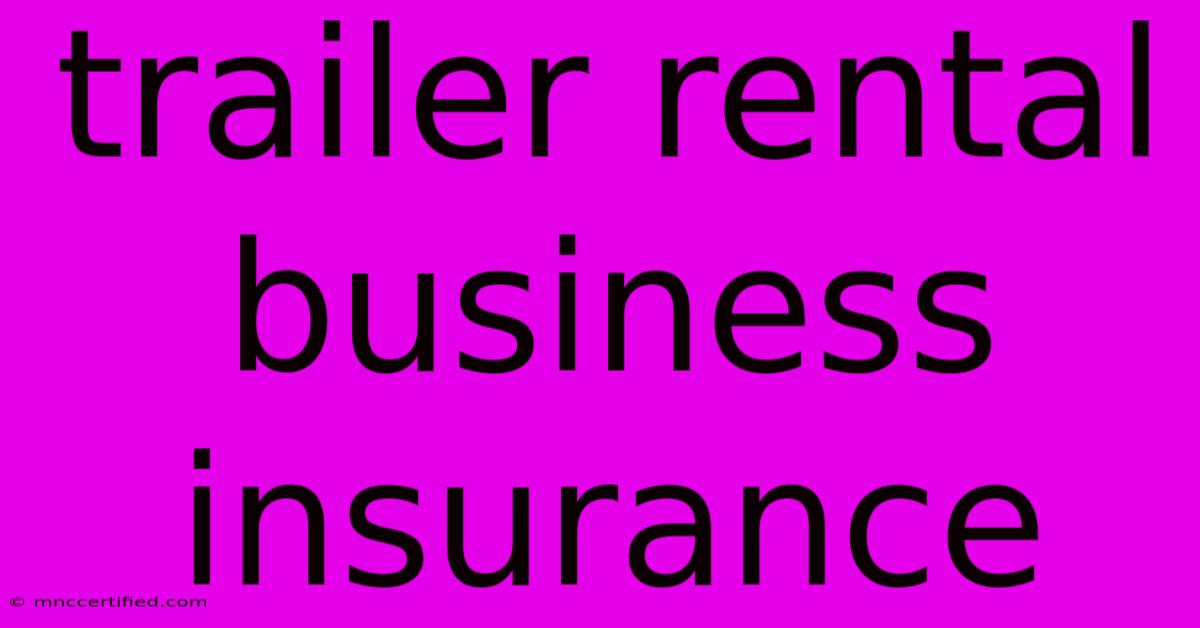Trailer Rental Business Insurance

Table of Contents
Trailer Rental Business Insurance: Protecting Your Investment and Your Clients
Starting a trailer rental business can be incredibly rewarding, but it also carries significant risks. Protecting your business from potential liabilities is crucial, and that starts with the right insurance. This comprehensive guide explores the essential insurance coverages every trailer rental business needs.
Understanding the Risks in the Trailer Rental Industry
Before diving into specific policies, let's examine the potential risks you face:
- Liability for Accidents: If a rented trailer is involved in an accident causing injury or property damage, you could be held liable, even if the accident wasn't your fault. This is where liability insurance becomes paramount.
- Trailer Damage or Theft: Your trailers represent a substantial investment. Protecting them from damage, theft, or vandalism is vital. This necessitates property insurance.
- Customer Injury on Your Property: If a customer is injured on your rental property, you could face lawsuits. Comprehensive liability coverage is necessary to mitigate this risk.
- Employee Injuries: If you have employees, you'll need workers' compensation insurance to cover medical expenses and lost wages in case of work-related injuries.
- Data Breaches: In today's digital age, storing customer data makes you vulnerable to data breaches. Cyber liability insurance can help protect you from financial losses associated with such events.
Essential Insurance Policies for Your Trailer Rental Business
Choosing the right insurance is critical for your business's survival and peace of mind. Here's a breakdown of essential policies:
1. General Liability Insurance
This is arguably the most important policy for any trailer rental business. General liability insurance protects you from financial losses due to bodily injury or property damage caused by your business operations, including accidents involving rented trailers. This coverage extends to third-party claims, shielding you from significant legal and financial burdens. Consider a higher coverage limit to adequately protect your assets.
2. Commercial Auto Insurance
If you or your employees use vehicles to transport trailers, commercial auto insurance is a must. This policy covers accidents involving your company vehicles, protecting you from liability claims and damage to your vehicles. Ensure the policy covers both owned and non-owned vehicles if your employees use their personal cars for business purposes.
3. Commercial Property Insurance
This policy protects your physical assets, including your trailers, office equipment, and buildings. Commercial property insurance covers losses due to fire, theft, vandalism, and other perils. Make sure to accurately assess the value of your trailers and other assets when determining your coverage limits.
4. Workers' Compensation Insurance (If Applicable)
If you employ others, workers' compensation insurance is legally mandated in most states. This policy covers medical expenses and lost wages for employees injured on the job. Failure to have this coverage can result in severe penalties.
5. Inland Marine Insurance
This specialized policy is designed to protect mobile equipment, such as your trailers, while they are being transported or rented out. Inland marine insurance covers loss or damage from various perils, including accidents, theft, and even weather-related events. This is particularly important for high-value trailers.
6. Umbrella Liability Insurance
This provides an additional layer of protection beyond your general liability and commercial auto policies. Umbrella liability insurance offers higher coverage limits, shielding your personal and business assets from catastrophic lawsuits. It’s a cost-effective way to significantly increase your protection.
7. Cyber Liability Insurance (Optional but Recommended)
While optional, cyber liability insurance is increasingly important, especially if you collect customer data online or process credit card payments. It covers costs associated with data breaches, including legal fees, notification costs, and credit monitoring for affected customers.
Finding the Right Insurance Provider
Choosing the right insurance provider involves comparing quotes from multiple insurers. Consider factors like:
- Coverage limits: Ensure the coverage limits are sufficient to protect your assets and business.
- Premium costs: Compare premiums from different insurers to find the most affordable option without sacrificing coverage.
- Customer service: Choose an insurer with a reputation for excellent customer service and claims handling.
- Financial stability: Select an insurer with a strong financial rating to ensure they can pay out claims when needed.
Don't underestimate the importance of adequate insurance. Protecting your business from financial ruin is crucial for long-term success. Consult with an insurance broker to determine the best coverage options for your specific needs and risk profile. The cost of insurance is a small price to pay for the peace of mind and security it provides.

Thank you for visiting our website wich cover about Trailer Rental Business Insurance. We hope the information provided has been useful to you. Feel free to contact us if you have any questions or need further assistance. See you next time and dont miss to bookmark.
Featured Posts
-
Met Office Snow Ice Warning Northwest England
Nov 19, 2024
-
Acceptance Insurance Wooster Ohio
Nov 19, 2024
-
New Fcc Chair Carr His Agenda
Nov 19, 2024
-
Wembley Sidemen Match Instant Sellout
Nov 19, 2024
-
Dentist Las Vegas Nv No Insurance
Nov 19, 2024